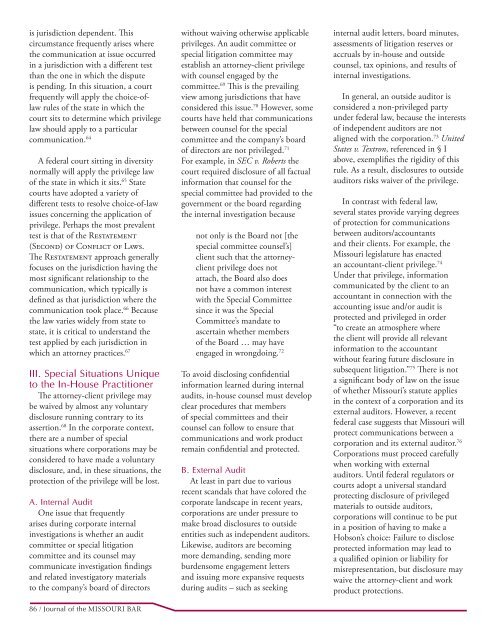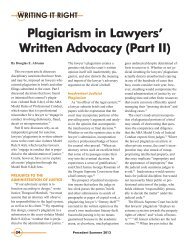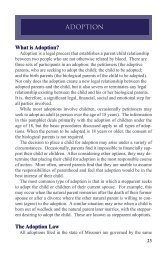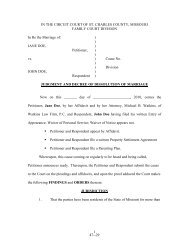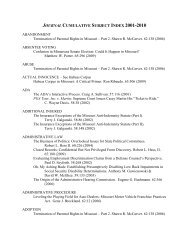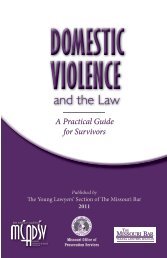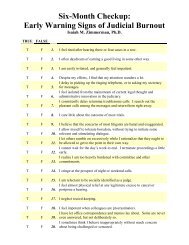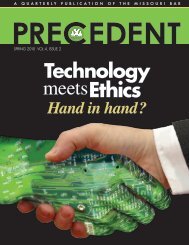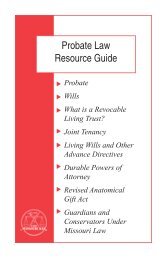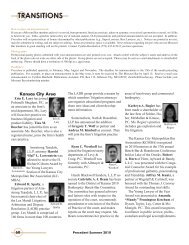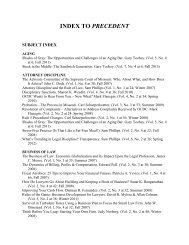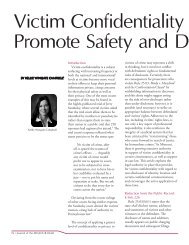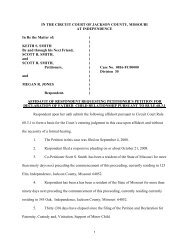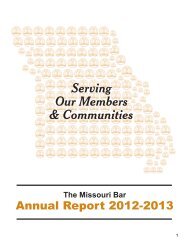An Essential Guide to Attorney-Client Privilege ... - the Missouri Bar
An Essential Guide to Attorney-Client Privilege ... - the Missouri Bar
An Essential Guide to Attorney-Client Privilege ... - the Missouri Bar
- No tags were found...
Create successful ePaper yourself
Turn your PDF publications into a flip-book with our unique Google optimized e-Paper software.
is jurisdiction dependent. Thiscircumstance frequently arises where<strong>the</strong> communication at issue occurredin a jurisdiction with a different testthan <strong>the</strong> one in which <strong>the</strong> disputeis pending. In this situation, a courtfrequently will apply <strong>the</strong> choice-oflawrules of <strong>the</strong> state in which <strong>the</strong>court sits <strong>to</strong> determine which privilegelaw should apply <strong>to</strong> a particularcommunication. 64A federal court sitting in diversitynormally will apply <strong>the</strong> privilege lawof <strong>the</strong> state in which it sits. 65 Statecourts have adopted a variety ofdifferent tests <strong>to</strong> resolve choice-of-lawissues concerning <strong>the</strong> application ofprivilege. Perhaps <strong>the</strong> most prevalenttest is that of <strong>the</strong> Restatement(Second) of Conflict of Laws.The Restatement approach generallyfocuses on <strong>the</strong> jurisdiction having <strong>the</strong>most significant relationship <strong>to</strong> <strong>the</strong>communication, which typically isdefined as that jurisdiction where <strong>the</strong>communication <strong>to</strong>ok place. 66 Because<strong>the</strong> law varies widely from state <strong>to</strong>state, it is critical <strong>to</strong> understand <strong>the</strong>test applied by each jurisdiction inwhich an at<strong>to</strong>rney practices. 67III. Special Situations Unique<strong>to</strong> <strong>the</strong> In-House PractitionerThe at<strong>to</strong>rney-client privilege maybe waived by almost any voluntarydisclosure running contrary <strong>to</strong> itsassertion. 68 In <strong>the</strong> corporate context,<strong>the</strong>re are a number of specialsituations where corporations may beconsidered <strong>to</strong> have made a voluntarydisclosure, and, in <strong>the</strong>se situations, <strong>the</strong>protection of <strong>the</strong> privilege will be lost.A. Internal AuditOne issue that frequentlyarises during corporate internalinvestigations is whe<strong>the</strong>r an auditcommittee or special litigationcommittee and its counsel maycommunicate investigation findingsand related investiga<strong>to</strong>ry materials<strong>to</strong> <strong>the</strong> company’s board of direc<strong>to</strong>rs86 / Journal of <strong>the</strong> MISSOURI BARwithout waiving o<strong>the</strong>rwise applicableprivileges. <strong>An</strong> audit committee orspecial litigation committee mayestablish an at<strong>to</strong>rney-client privilegewith counsel engaged by <strong>the</strong>committee. 69 This is <strong>the</strong> prevailingview among jurisdictions that haveconsidered this issue. 70 However, somecourts have held that communicationsbetween counsel for <strong>the</strong> specialcommittee and <strong>the</strong> company’s boardof direc<strong>to</strong>rs are not privileged. 71For example, in SEC v. Roberts <strong>the</strong>court required disclosure of all factualinformation that counsel for <strong>the</strong>special committee had provided <strong>to</strong> <strong>the</strong>government or <strong>the</strong> board regarding<strong>the</strong> internal investigation becausenot only is <strong>the</strong> Board not [<strong>the</strong>special committee counsel’s]client such that <strong>the</strong> at<strong>to</strong>rneyclientprivilege does notattach, <strong>the</strong> Board also doesnot have a common interestwith <strong>the</strong> Special Committeesince it was <strong>the</strong> SpecialCommittee’s mandate <strong>to</strong>ascertain whe<strong>the</strong>r membersof <strong>the</strong> Board … may haveengaged in wrongdoing. 72To avoid disclosing confidentialinformation learned during internalaudits, in-house counsel must developclear procedures that membersof special committees and <strong>the</strong>ircounsel can follow <strong>to</strong> ensure thatcommunications and work productremain confidential and protected.B. External AuditAt least in part due <strong>to</strong> variousrecent scandals that have colored <strong>the</strong>corporate landscape in recent years,corporations are under pressure <strong>to</strong>make broad disclosures <strong>to</strong> outsideentities such as independent audi<strong>to</strong>rs.Likewise, audi<strong>to</strong>rs are becomingmore demanding, sending moreburdensome engagement lettersand issuing more expansive requestsduring audits – such as seekinginternal audit letters, board minutes,assessments of litigation reserves oraccruals by in-house and outsidecounsel, tax opinions, and results ofinternal investigations.In general, an outside audi<strong>to</strong>r isconsidered a non-privileged partyunder federal law, because <strong>the</strong> interestsof independent audi<strong>to</strong>rs are notaligned with <strong>the</strong> corporation. 73 UnitedStates v. Textron, referenced in § Iabove, exemplifies <strong>the</strong> rigidity of thisrule. As a result, disclosures <strong>to</strong> outsideaudi<strong>to</strong>rs risks waiver of <strong>the</strong> privilege.In contrast with federal law,several states provide varying degreesof protection for communicationsbetween audi<strong>to</strong>rs/accountantsand <strong>the</strong>ir clients. For example, <strong>the</strong><strong>Missouri</strong> legislature has enactedan accountant-client privilege. 74Under that privilege, informationcommunicated by <strong>the</strong> client <strong>to</strong> anaccountant in connection with <strong>the</strong>accounting issue and/or audit isprotected and privileged in order“<strong>to</strong> create an atmosphere where<strong>the</strong> client will provide all relevantinformation <strong>to</strong> <strong>the</strong> accountantwithout fearing future disclosure insubsequent litigation.” 75 There is nota significant body of law on <strong>the</strong> issueof whe<strong>the</strong>r <strong>Missouri</strong>’s statute appliesin <strong>the</strong> context of a corporation and itsexternal audi<strong>to</strong>rs. However, a recentfederal case suggests that <strong>Missouri</strong> willprotect communications between acorporation and its external audi<strong>to</strong>r. 76Corporations must proceed carefullywhen working with externalaudi<strong>to</strong>rs. Until federal regula<strong>to</strong>rs orcourts adopt a universal standardprotecting disclosure of privilegedmaterials <strong>to</strong> outside audi<strong>to</strong>rs,corporations will continue <strong>to</strong> be putin a position of having <strong>to</strong> make aHobson’s choice: Failure <strong>to</strong> discloseprotected information may lead <strong>to</strong>a qualified opinion or liability formisrepresentation, but disclosure maywaive <strong>the</strong> at<strong>to</strong>rney-client and workproduct protections.


